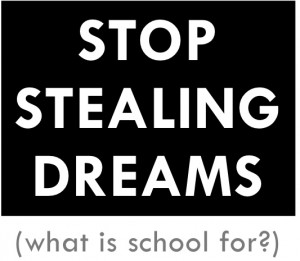 After finishing Daniel Pink’s book Drive, which I reviewed in a previous post, I heard about a new effort by Seth Godin discussing the school system as it exists today throughout the western world. Godin is an fascinating individual who’s interests lie mostly in marketing, leadership and change. He has written several books – one I particularly like is a short read called The Dip; it is about the discernment required, when learning a new skill, to know how and when to pursue mastery. Maybe I’ll re-read it one day and put a review up.
After finishing Daniel Pink’s book Drive, which I reviewed in a previous post, I heard about a new effort by Seth Godin discussing the school system as it exists today throughout the western world. Godin is an fascinating individual who’s interests lie mostly in marketing, leadership and change. He has written several books – one I particularly like is a short read called The Dip; it is about the discernment required, when learning a new skill, to know how and when to pursue mastery. Maybe I’ll re-read it one day and put a review up.
Stop Stealing Dreams is described as a manifesto that poses hard questions about the effectiveness of public schools in order to start a discussion about how the school system could be turned into something that is far more relevant to the world our kids will live and work in. Godin says, “It’s a series of provocations, ones that might resonate and that I hope will provoke conversation.” The entire Stop Stealing Dreams manifesto is available in several formats (PDF, ePub, HTML) on the web, grab a copy that suits you and have a read.
The tie in to Daniel Pink is that in Drive, there is some discussion of how the school system, as it currently exists, harms kid’s innate curiosity, their natural desire for purpose and need for mastery by sticking to extrinsic, carrot and stick, forms of motivation. Godin’s manifesto not only supports that view, but goes further to state that the school system, by its very design, suppresses individual creativity and curiosity in favour of an outmoded “drill & kill” reliance on a memorization-based fixed curriculum. If the 21st century is the knowledge age, then school’s mission “to create homogenized, obedient, satisfied workers and pliant, eager consumers“, based on the needs of the early 20th century industrialized economy, is simply out-dated and counter-productive.
What would school look like if the goal was to graduate creative, independent, insightful and innovative young adults and unleash them on the world?
What would school look like if conformity was not the highest goal of the system of education?



